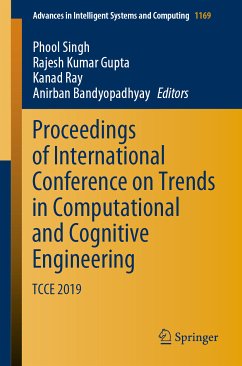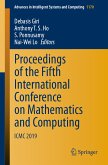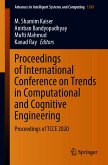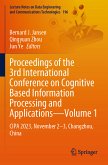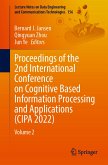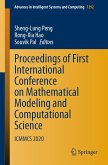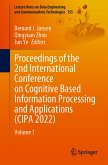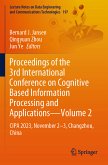Proceedings of International Conference on Trends in Computational and Cognitive Engineering (eBook, PDF)
TCCE 2019
Redaktion: Singh, Phool; Bandyopadhyay, Anirban; Ray, Kanad; Gupta, Rajesh Kumar
113,95 €
113,95 €
inkl. MwSt.
Sofort per Download lieferbar

57 °P sammeln
113,95 €
Als Download kaufen

113,95 €
inkl. MwSt.
Sofort per Download lieferbar

57 °P sammeln
Jetzt verschenken
Alle Infos zum eBook verschenken
113,95 €
inkl. MwSt.
Sofort per Download lieferbar
Alle Infos zum eBook verschenken

57 °P sammeln
Proceedings of International Conference on Trends in Computational and Cognitive Engineering (eBook, PDF)
TCCE 2019
Redaktion: Singh, Phool; Bandyopadhyay, Anirban; Ray, Kanad; Gupta, Rajesh Kumar
- Format: PDF
- Merkliste
- Auf die Merkliste
- Bewerten Bewerten
- Teilen
- Produkt teilen
- Produkterinnerung
- Produkterinnerung

Bitte loggen Sie sich zunächst in Ihr Kundenkonto ein oder registrieren Sie sich bei
bücher.de, um das eBook-Abo tolino select nutzen zu können.
Hier können Sie sich einloggen
Hier können Sie sich einloggen
Sie sind bereits eingeloggt. Klicken Sie auf 2. tolino select Abo, um fortzufahren.

Bitte loggen Sie sich zunächst in Ihr Kundenkonto ein oder registrieren Sie sich bei bücher.de, um das eBook-Abo tolino select nutzen zu können.
This book presents various computational and cognitive modeling approaches in the areas of health, education, finance, theenvironment, engineering, commerce and industry. Gathering selected conference papers presented atthe International Conference on Trends in Computational and Cognitive Engineering (TCCE), it sharescutting-edge insights and ideas from mathematicians, engineers, scientists and researchers anddiscusses fresh perspectives on problem solving in a range of research areas.
- Geräte: PC
- ohne Kopierschutz
- eBook Hilfe
- Größe: 15.09MB
Andere Kunden interessierten sich auch für
![Proceedings of the Fifth International Conference on Mathematics and Computing (eBook, PDF) Proceedings of the Fifth International Conference on Mathematics and Computing (eBook, PDF)]() Proceedings of the Fifth International Conference on Mathematics and Computing (eBook, PDF)113,95 €
Proceedings of the Fifth International Conference on Mathematics and Computing (eBook, PDF)113,95 €![Proceedings of International Conference on Trends in Computational and Cognitive Engineering (eBook, PDF) Proceedings of International Conference on Trends in Computational and Cognitive Engineering (eBook, PDF)]() Proceedings of International Conference on Trends in Computational and Cognitive Engineering (eBook, PDF)161,95 €
Proceedings of International Conference on Trends in Computational and Cognitive Engineering (eBook, PDF)161,95 €![Proceedings of the 3rd International Conference on Cognitive Based Information Processing and Applications-Volume 1 (eBook, PDF) Proceedings of the 3rd International Conference on Cognitive Based Information Processing and Applications-Volume 1 (eBook, PDF)]() Proceedings of the 3rd International Conference on Cognitive Based Information Processing and Applications-Volume 1 (eBook, PDF)186,95 €
Proceedings of the 3rd International Conference on Cognitive Based Information Processing and Applications-Volume 1 (eBook, PDF)186,95 €![Proceedings of the 2nd International Conference on Cognitive Based Information Processing and Applications (CIPA 2022) (eBook, PDF) Proceedings of the 2nd International Conference on Cognitive Based Information Processing and Applications (CIPA 2022) (eBook, PDF)]() Proceedings of the 2nd International Conference on Cognitive Based Information Processing and Applications (CIPA 2022) (eBook, PDF)258,95 €
Proceedings of the 2nd International Conference on Cognitive Based Information Processing and Applications (CIPA 2022) (eBook, PDF)258,95 €![Proceedings of First International Conference on Mathematical Modeling and Computational Science (eBook, PDF) Proceedings of First International Conference on Mathematical Modeling and Computational Science (eBook, PDF)]() Proceedings of First International Conference on Mathematical Modeling and Computational Science (eBook, PDF)161,95 €
Proceedings of First International Conference on Mathematical Modeling and Computational Science (eBook, PDF)161,95 €![Proceedings of the 2nd International Conference on Cognitive Based Information Processing and Applications (CIPA 2022) (eBook, PDF) Proceedings of the 2nd International Conference on Cognitive Based Information Processing and Applications (CIPA 2022) (eBook, PDF)]() Proceedings of the 2nd International Conference on Cognitive Based Information Processing and Applications (CIPA 2022) (eBook, PDF)258,95 €
Proceedings of the 2nd International Conference on Cognitive Based Information Processing and Applications (CIPA 2022) (eBook, PDF)258,95 €![Proceedings of the 3rd International Conference on Cognitive Based Information Processing and Applications-Volume 2 (eBook, PDF) Proceedings of the 3rd International Conference on Cognitive Based Information Processing and Applications-Volume 2 (eBook, PDF)]() Proceedings of the 3rd International Conference on Cognitive Based Information Processing and Applications-Volume 2 (eBook, PDF)186,95 €
Proceedings of the 3rd International Conference on Cognitive Based Information Processing and Applications-Volume 2 (eBook, PDF)186,95 €-
-
-
This book presents various computational and cognitive modeling approaches in the areas of health, education, finance, theenvironment, engineering, commerce and industry. Gathering selected conference papers presented atthe International Conference on Trends in Computational and Cognitive Engineering (TCCE), it sharescutting-edge insights and ideas from mathematicians, engineers, scientists and researchers anddiscusses fresh perspectives on problem solving in a range of research areas.
Dieser Download kann aus rechtlichen Gründen nur mit Rechnungsadresse in A, B, BG, CY, CZ, D, DK, EW, E, FIN, F, GR, HR, H, IRL, I, LT, L, LR, M, NL, PL, P, R, S, SLO, SK ausgeliefert werden.
Produktdetails
- Produktdetails
- Verlag: Springer Nature Singapore
- Seitenzahl: 372
- Erscheinungstermin: 30. September 2020
- Englisch
- ISBN-13: 9789811554148
- Artikelnr.: 60310786
- Verlag: Springer Nature Singapore
- Seitenzahl: 372
- Erscheinungstermin: 30. September 2020
- Englisch
- ISBN-13: 9789811554148
- Artikelnr.: 60310786
- Herstellerkennzeichnung Die Herstellerinformationen sind derzeit nicht verfügbar.
Dr. Phool Singh received his Ph.D. in Mathematics from Banasthali University in the area of computational fluid dynamics and M.Phil., M.Sc. and B.Sc. from Maharshi Dayanand University, Rohtak. He has been working in Central University of Haryana as Associate Professor of Mathematics under the School of Engineering and Technology. Earlier, Dr Singh has served Avvaiyar Government College for Women, Karaikal, Puducherry, and The NorthCap University, Gurugram, as Assistant Professor of Mathematics. In 2006, he qualified CSIR-NET and GATE with all India rank 23. He is an active researcher and published more than 35 research papers in international journals of repute and edited two conference proceedings. He has diverse research interests encompassing optical image processing, computational neuroscience and computational fluid dynamics and promotes open-source softwares like Scilab, Octave, OpenFOAM, Python. He has also worked as principal investigator in a project (Parkinson's disease) funded by Cognitive Science Research Initiative (CSRI-DST). Dr Rajesh Kumar Gupta is an Associate Professor of Mathematics at Central University of Haryana and Central University of Punjab (on lien), India. He has more than 13 years of teaching and research experience. He has published 65 research papers in reputed international journals including 42 SCI listed papers with total impact factor more than 100. He has supervised 9 Ph.D. theses and 12 M.Sc. theses. He has been selected for prestigious UGC Research Award for the period 2016-18. He is principle investigator of two major research projects of worth approximately 33 lakhs, sponsored by CSIR and NBHM. His research interests revolve around the applications of symmetry analysis to nonlinear partial differential equations governing important physical phenomena. He has worked on several nonlinear systems including variable coefficients KdV, Boussinesq, BBM and Broer-Kaup equations, coupledHiggs field equation, Hamiltonian amplitude equation, coupled Klein-Gordon-Schrödinger and some highly nonlinear Einstein field equations. Dr. Kanad Ray is a Professor and Head of the Department of Physics at the Amity School of Applied Sciences Physics Amity University Rajasthan (AUR), Jaipur, India. He has obtained M.Sc. & Ph.D. degrees in Physics from Calcutta University & Jadavpur University, West Bengal, India. In an academic career spanning over 22 years, he has published and presented research papers in several national and international journals and conferences in India and abroad. He has authored a book on the electromagnetic field theory. Prof. Ray's current research areas of interest include cognition, communication, electromagnetic field theory, antenna & wave propagation, microwave, computational biology and applied physics. He has served as Editor of Springer Book Series such as AISC and LNEE. and an Associated Editor of Journal of Integrative Neuroscience published by IOS Press, Netherlands. He has established an MOU between his University and University of Montreal, Canada, for various joint research activities. He has also established MOU with National Institute for Materials Science (NIMS), Japan, for joint research activities and visits NIMS as a Visiting Scientist. He had been Visiting Professor to Universiti Teknologi Malaysia (UTM) and Universiti Teknikal Malaysia Melaka (UTeM), Malaysia. He had organized international conference series such as SoCTA, ICOEVCI as General Chair. He is a Senior Member, IEEE and an Executive Committee Member of IEEE Rajasthan. He has visited Netherlands, Turkey, China, Czechoslovakia, Russia, Portugal, Finland, Belgium, South Africa, Japan, Malaysia, Thailand, Singapore, etc., for various academic missions. Dr. Anirban Bandyopadhyay is a Senior Scientist at the National Institute for Materials Science (NIMS), Tsukuba, Japan. He completed his Ph.D. in Supramolecular Electronics at the Indian Association for the Cultivation of Science (IACS), Kolkata, 2005. From 2005 to 2008, he was an independent researcher, as an ICYS Research Fellow at the International Center for Young Scientists (ICYS), NIMS, Japan, where he worked on the brain-like bio-processor building. In 2008, he joined as a Permanent Scientist at NIMS, working on the cavity resonator model of human brain and design synthesis of brain-like organic jelly. From 2013 to 2014, he was a Visiting Scientist at the Massachusetts Institute of Technology (MIT), USA. He has received several honors, such as the Hitachi Science and Technology award 2010, Inamori Foundation award 2011-2012, Kurata Foundation Award, Inamori Foundation Fellow (2011-), and Sewa Society International Member, Japan. He has patented ten inventions (i) a time crystal model for building an artificial human brain, (ii) geometric-musical language to operate a fractal tape to replace the Turing tape, (iii) fourth circuit element that is not memristor, (iii) cancer & alzheimers drug, (iv) nano-submarine as a working factory & nano-surgeon, (vi) fractal condensation-based synthesis, (vii) a thermal noise harvesting chip, (viii) a new generation of molecular rotor, (ix) spontaneous self-programmable synthesis (programmable matter) (x) fractal grid scanner for dielectric imaging. He has also designed and built multiple machines and technologies, (i) THz-magnetic nano-sensor, (ii) a new class of fusion resonator antenna, etc. Currently, he is building time crystal-based artificial brain using three ways, (i) knots of darkness made of fourth circuit element, (ii) integrated circuit design and (iii) organic supramolecular structure.
Optical Chaotic Cryptosystem for Phase Images Using Random Amplitude and Phase Masks with Lorenz Map in Fresnel Domain.- Exact Series Solutions and Conservation Laws of Time Fractional Three Coupled KdV System.- Asymmetric Cryptosystem Using Structured Phase Masks in Discrete Cosine and Fractional Fourier Transforms.- Impact of Interchange of Coefficients on Various Fixed Point Iterative Schemes.- Quaternion, Octonion to Dodecanion Manifold: Stereographic Projections from Infinity Lead to a Self-Operating Mathematical Universe.- Biogeography Based Optimization (BBO) Trained Neural Networks for Wind Speed Forecasting.- Extended VIKOR-TODIM Approach Based on Entropy weight for Intuitionistic Fuzzy Sets.- A Novel Algorithm for Allocation of General Elective Subjects in Choice Based Credit System.- Mathematical Modeling of Carotid Artery with an Incompressible, Newtonian and Axisymmetric Flow.- On the Mild Solutions of Impulsive Semilinear Fractional Evolution Equations.
Optical Chaotic Cryptosystem for Phase Images Using Random Amplitude and Phase Masks with Lorenz Map in Fresnel Domain.- Exact Series Solutions and Conservation Laws of Time Fractional Three Coupled KdV System.- Asymmetric Cryptosystem Using Structured Phase Masks in Discrete Cosine and Fractional Fourier Transforms.- Impact of Interchange of Coefficients on Various Fixed Point Iterative Schemes.- Quaternion, Octonion to Dodecanion Manifold: Stereographic Projections from Infinity Lead to a Self-Operating Mathematical Universe.- Biogeography Based Optimization (BBO) Trained Neural Networks for Wind Speed Forecasting.- Extended VIKOR-TODIM Approach Based on Entropy weight for Intuitionistic Fuzzy Sets.- A Novel Algorithm for Allocation of General Elective Subjects in Choice Based Credit System.- Mathematical Modeling of Carotid Artery with an Incompressible, Newtonian and Axisymmetric Flow.- On the Mild Solutions of Impulsive Semilinear Fractional Evolution Equations.
